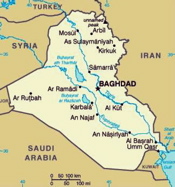Iraq's refugees tell heartbreaking accounts of suffering, displacement, and shattered dreams, but these refugees represent more than mere human interest stories. Collectively, the outpouring of millions of Iraqi refugees into a very small number of neighboring countries poses a dramatic security threat to the Middle East, and there is no sign that threat is going away. In the lead up to the Iraq war, most of the U.S. government discussion about refugees assumed that refugee flows would be sudden, massive and brief. When more than a million Kurds fled Iraq into Turkey and Iran in 1991 to avoid Saddam's wrath, camps were set up within days. The U.S. military dropped food and supplies, and provided protection for those trapped within Iraq's borders. A few months later, the crisis was over, and refugees returned to their homes. Iraq's refugees now are not like the refugees then. They have fled slowly, not suddenly. They live in capital cities such as Damascus and Amman, not in open fields or encampments. And they are not peasants or craftsmen who can eke out a living on meager resources; they are white-collar workers with education and training but little future in their homeland.
U.S. Must Do More to Abate Threat Posed by Iraqi Refugee Flows

